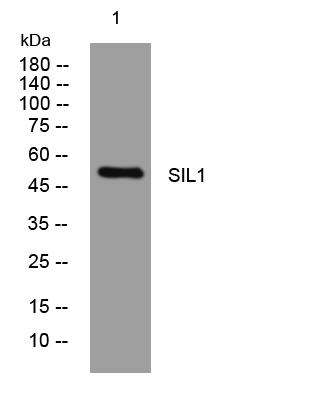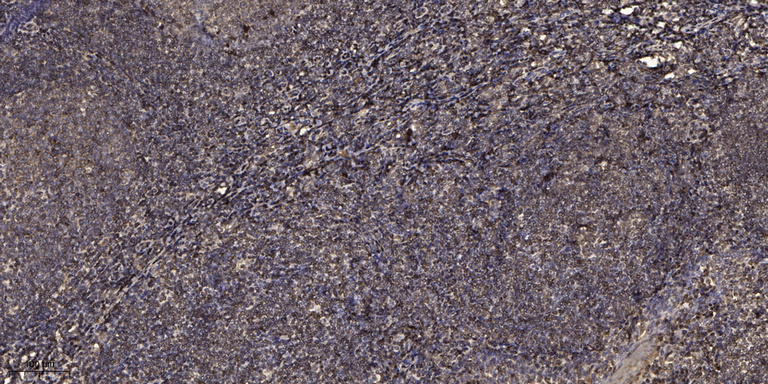SIL1 rabbit pAb
- Catalog No.:YT7002
- Applications:WB;ELISA;IHC
- Reactivity:Human;Mouse;Rat
- Target:
- SIL1
- Fields:
- >>Protein processing in endoplasmic reticulum
- Gene Name:
- SIL1 UNQ545/PRO836
- Protein Name:
- SIL1
- Human Gene Id:
- 64374
- Human Swiss Prot No:
- Q9H173
- Mouse Gene Id:
- 81500
- Mouse Swiss Prot No:
- Q9EPK6
- Rat Gene Id:
- 291673
- Rat Swiss Prot No:
- Q6P6S4
- Immunogen:
- Synthesized peptide derived from human SIL1 AA range: 169-219
- Specificity:
- This antibody detects endogenous levels of SIL1 at Human/Mouse/Rat
- Formulation:
- Liquid in PBS containing 50% glycerol, 0.5% BSA and 0.02% sodium azide.
- Source:
- Polyclonal, Rabbit,IgG
- Dilution:
- WB 1:500-2000;IHC 1:50-300; ELISA 2000-20000
- Purification:
- The antibody was affinity-purified from rabbit antiserum by affinity-chromatography using epitope-specific immunogen.
- Concentration:
- 1 mg/ml
- Storage Stability:
- -15°C to -25°C/1 year(Do not lower than -25°C)
- Molecular Weight(Da):
- 51kD
- Background:
- This gene encodes a resident endoplasmic reticulum (ER), N-linked glycoprotein with an N-terminal ER targeting sequence, 2 putative N-glycosylation sites, and a C-terminal ER retention signal. This protein functions as a nucleotide exchange factor for another unfolded protein response protein. Mutations in this gene have been associated with Marinesco-Sjogren syndrome. Alternate transcriptional splice variants have been characterized. [provided by RefSeq, Jul 2008],
- Function:
- developmental stage:Expressed in fetal kidney, fetal lung, fetal liver and at low levels in fetal brain.,disease:Defects in SIL1 are a cause of Marinesco-Sjoegren syndrome (MSS) [MIM:248800]. MSS is an autosomal recessive multisystem disorder which is characterized by cerebellar ataxia due to cerebellar atrophy, with Purkinje and granule cell loss and myopathy featuring marked muscle replacement with fat and connective tissue. Other cardinal features include bilateral cataracts, hypergonadotrophic hypogonadism and mild to severe mental retardation. Skeletal abnormalities, short stature, dysarthria, strabismus and nystagmus are also frequent findings. Mutational inactivation of this protein may result in ER stress-induced cell death signaling or malfunctioning chaperone machineries that mishandle client proteins which are critical for the organs targeted in MSS.,function:Required for prot
- Subcellular Location:
- Endoplasmic reticulum lumen .
- Expression:
- Highly expressed in tissues which produce large amounts of secreted proteins such as kidney, liver and placenta. Also expressed in colon, heart, lung, ovary, pancreas, peripheral leukocyte, prostate, spleen and thymus. Expressed at low levels throughout the brain.
- June 19-2018
- WESTERN IMMUNOBLOTTING PROTOCOL
- June 19-2018
- IMMUNOHISTOCHEMISTRY-PARAFFIN PROTOCOL
- June 19-2018
- IMMUNOFLUORESCENCE PROTOCOL
- September 08-2020
- FLOW-CYTOMEYRT-PROTOCOL
- May 20-2022
- Cell-Based ELISA│解您多样本WB检测之困扰
- July 13-2018
- CELL-BASED-ELISA-PROTOCOL-FOR-ACETYL-PROTEIN
- July 13-2018
- CELL-BASED-ELISA-PROTOCOL-FOR-PHOSPHO-PROTEIN
- July 13-2018
- Antibody-FAQs
- Products Images

- Western blot analysis of lysates from A431 cells, primary antibody was diluted at 1:1000, 4°over night

- Immunohistochemical analysis of paraffin-embedded human tonsil. 1, Antibody was diluted at 1:200(4° overnight). 2, Tris-EDTA,pH9.0 was used for antigen retrieval. 3,Secondary antibody was diluted at 1:200(room temperature, 45min).



